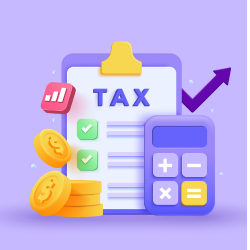
Peer-to-peer transactions have significantly changed the way we do business, with a range of new fintech tools aiding businesses and shoppers around the world. Payment convenience has come a long way—yet very little has changed regarding what the IRS expects from taxable income declarations. Although recent and proposed laws and amendments aim to increase transparency within digital payments when it comes to taxes, payment tools like Zelle seem to fly under legislators’ radars.
Here, we’ll look at tax implications regarding Zelle in contrast to other payment services. Does Zelle report to the IRS—or is the platform a digital payments tax haven from updated tax rules? We’ll also look at how this might impact your choice to use Zelle as a payment service for your business.
Does Zelle Report to the IRS? Tax Implications and Regulations
Since January 2022, payment processing apps have been required to report business transactions processed through their service to the IRS. As such, apps like Venmo, PayPal, and CashApp now provide business owners with Form 1099-K. This is meant to detail commercial income received through the app exceeding $600 annually. Not only does this provide transparency regarding business income, but it also simplifies income tracking and reporting for businesses.
Zelle, however, doesn’t provide business owners with Form 1099-K—nor does it report transactions to the IRS. Unlike its competitors, Zelle does not hold any funds; it merely facilitates transactions directly between bank accounts. For this reason, it’s not legally subject to the same reporting requirements. Even if users have a Zelle business account through which they receive more than $600 worth of business transactions annually, the platform does not report this to the IRS.
Nevertheless, just because Zelle doesn’t report this income, it does not exempt users from doing so themselves. Income tax rules remain the same for businesses, regardless of the payment platform or method used.
Your Tax Reporting Responsibilities As A Zelle User
Any business income you receive via Zelle, Venmo, Cash App, or PayPal is taxable. This applies regardless of whether it’s payment for work as a freelancer, services provided, or goods you sell for a profit. Failing to report this taxable income can result in penalties and have major financial implications for you and your business.
Even though Zelle does not report transactions for taxes, keep in mind that other companies you do business with (Paypal, Venmo etc.) will likely still file tax forms to the IRS regarding the money you receive. Even if the prospect of paying these platforms’ fees is unappealing (after all, one of Zelle’s chief advantages is that it is free), their reports and tracking can make it easier for you to consolidate your finances at the end of the tax year. Also, these processing fees are tax-deductible business expenses. If you process a high number of transactions through payment apps, this can benefit you in reducing tax liability.
For instance, businesses are required to file Form 1099-NEC to report compensation (of over $600 annually) to non-employees. Therefore, if you are a freelancer, contractor, or self-employed and receive more than $600 throughout the year from any given company in payment for work or goods provided, they are legally required to provide you with a 1099-NEC. This applies regardless of the payment method used—cash, Zelle, PayPal, or Venmo.
Whichever 1099 form you receive, whether it’s a 1099-NEC or 1099-K from a business or payment service provider, it is important to keep detailed records of it. This allows you to compare records and dispute errors before filing your tax return. In turn, this protects you and your business, should the IRS conduct an audit for any reason.

Investigating Potential Zelle Tax Loopholes
Let’s recap. Does Zelle report to the IRS? No. Do you need to pay taxes on Zelle business transactions? Yes.
Some Zelle users may consider taking the risk of avoiding reporting income received via Zelle; however, this is illegal and can cost you greatly in the long run. It might take a little more effort for the IRS to track payments received via Zelle—but it’s still possible for the institution to do so if they find a reason to audit you. Zelle has no responsibility for your tax filing or income; therefore, if you try using Zelle as a tax loophole, you do so entirely at your own risk.

Which Zelle Activities Do Not Require Tax Reporting?
Any income from a business transaction you receive is taxable. Personal transactions—such as sending money to a friend for a shared meal or sending a birthday gift—are not. Payment apps usually provide the option to indicate whether a transaction is for business or personal purposes. In addition, most apps do not allow you to use a P2P account to conduct business transactions.
Two other exceptions when it comes to taxable income are reimbursements and selling personal items at a loss. Let’s say, for instance, your business ordered (and paid) $200 worth of stock from a vendor. When the stock arrived, it was damaged, and you returned it. The vendor refunded you the $200. This payment is not taxable.
Understanding Form 1099-K Issuance—In Relation to Zelle
Form 1099-K is a report of payments a business receives, issued by payment card companies, payment apps, and online marketplaces. These third-party networks provide a copy to both the IRS and the account holder before January 31 of each year. (Note that Form 1099-K should not include personal gifts or reimbursement of personal expenses.) Account holders who receive a Form 1099-K should use this with other tax records to report their taxable income.
If your financial institution has included personal transactions that aren’t taxable, you can request a corrected form from the payment processor and file a correction with the IRS. If you don’t address it, the IRS will assume it’s taxable. This is why it’s important to indicate, at the time of processing, whether payments are for business or personal reasons.
And since Zelle does not issue a Form 1099-K to the IRS or its users, you will have to keep track of your taxable income on your own.
Tips to Effectively Manage Taxation Through Zelle
When using Zelle, you’ll need to be diligent in keeping your records up to date to avoid panic and inaccuracies come filing season. Apply these tips for organizing your Zelle taxes throughout the year.
- Keep your personal and business transactions separate. This makes it easier to track business income and can help protect personal assets.
- Report your income even if you did not receive a form. Just because a form did not arrive, doesn’t mean you can avoid taxes.
- Keep adequate records throughout the year and set up a system for receipts. It will save you time and help ensure your tax return is correct.
- Classify your business. Choosing the most suitable business structure can provide tax advantages. Consult a tax attorney or CPA to ensure you select the one that best fits your setup.
- Research small business and self-employment tax deductions and subscribe to e-News for Small Businesses. E-News for Small Businesses is a free e-mail newsletter providing tax information such as tips, reminders, and special announcements.
- Know your limits. If you struggle to stay on top of your Zelle taxes, get help from a professional or consider another payment option that makes this easier for you. Ultimately, it’s solely your responsibility to file your tax return.
Your Business, Zelle Taxes, and Fiscal Responsibility
Without tracking your business income, expenses, and payments, it’s hard to achieve your goals and stay on top of tax responsibilities. If you find it challenging to consolidate your finances or keep taxes down to a minimum while using a Zelle business account, it may be time to consider an alternative.
That’s where PaymentCloud can help. With a dedicated account manager, PaymentCloud will help you find a payment processor that works for your business and needs. We’ll help you find a solution that integrates with your larger financial ecosystem to automate tracking to ensure proper record-keeping so that your business is covered come tax time.





